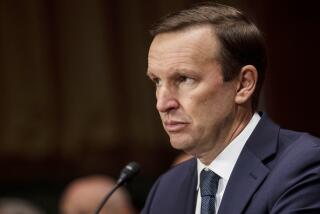Senate Panel Says It May Chop Defense Budget Hike in Half
WASHINGTON — Members of the Senate Armed Services Committee today told Defense Secretary Caspar W. Weinberger that Congress may try to cut by nearly half the spending growth proposed in the Pentagon’s $277.5-billion budget.
Weinberger warned that such a reduction would imperil President Reagan’s military buildup, remove Soviet incentives to negotiate seriously at arms control talks and might compel the mustering out of two divisions of combat troops, triggering increased domestic unemployment.
Testifying before the committee, he urged Congress to “stay the course” on “a long-range program to restore and strengthen U.S. national security.”
Success in Balance
“The success of that program hangs in the balance,” Weinberger said. “I would like to urge that (Congress) not be lured by the deficit situation into making additional reductions to defense.”
But senator after senator from both parties made clear that they believe reductions in the defense buildup will be made, with the only question being how much and where. None was heard to predict that defense spending will not be trimmed.
Sen. Barry Goldwater (R-Ariz.), the committee chairman, said that while he opposes a freeze in defense spending as “highly irresponsible,” he believes that “all areas of the government have helped to create the deficit and now all must contribute to reducing it.”
Defense No Exception
“Defense is no exception,” Goldwater said.
Sen. John C. Stennis (D-Miss.), a former Armed Services chairman and a staunch military advocate, told Weinberger: “I have a growing apprehension about the financial affairs of this government. . . . I may not vote for all these items this year. . . . I’m going to vote for something that I think has a chance of passing.”
“The defense budget is going to be cut,” said Sen. Carl Levin (D-Mich.). “Everybody around here knows it. The issue is where it’s going to be cut and how much it’s going to be cut.”
Sen. Mark O. Hatfield (R-Ore.), chairman of the Senate Appropriations Committee, issued a statement saying that “a freeze on defense spending remains the absolute minimum requirement” in the face of budget deficts projected at $180 billion for fiscal 1986.
5.9% Above Inflation
The defense budget presented by Reagan calls for spending growth of 5.9% above the rate of inflation during fiscal 1986. With inflation aside, Weinberger said that amounts to a 10% growth over fiscal 1985.
Sen. J. James Exon (D-Neb.) said that while he does not believe an “absolute freeze” in defense spending is practical, either in terms of U.S. defense needs or in the effect it would have on U.S. allies, cuts will be made.
“I’m going to predict we’ll be somewhere in the area of 3% or 4%,” Exon said.
More to Read
Get the L.A. Times Politics newsletter
Deeply reported insights into legislation, politics and policy from Sacramento, Washington and beyond. In your inbox three times per week.
You may occasionally receive promotional content from the Los Angeles Times.










